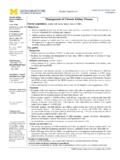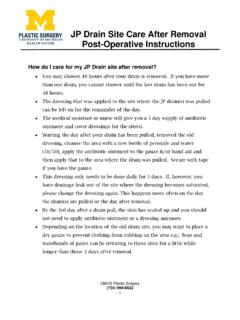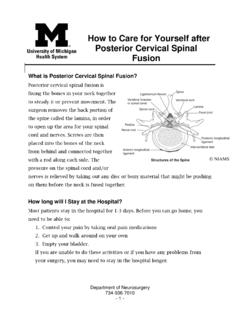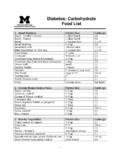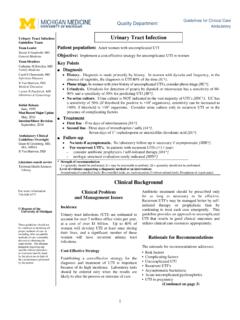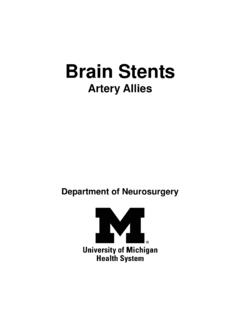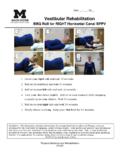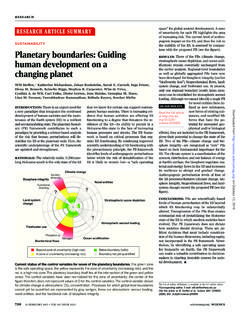Transcription of GUIDELINES FOR TERMINATING TREATMENT
1 GUIDELINES FOR TERMINATING TREATMENT . These GUIDELINES are based on case law and other legal principles and practices, professional (clinical) practice, and principles of ethical decision-making. I. INTRODUCTION. A. Purpose of this document. This document provides general GUIDELINES for health care professionals in making decisions concerning TREATMENT for the terminally ill, for patients who have lost cognitive function, or for patients who refuse care. B. Advance Directives. An advance directive is a document drafted by a competent adult stating the adult's wishes in the event of incompetency. The document can state the individual's preferences for health care (a living will) and can also name an advocate to act on the individual's behalf (a durable power of attorney for health care). Michigan has a durable power of attorney for health care law and its elements are described in Appendix A.
2 Michigan case law also recognizes the usefulness of a living will as valuable evidence of a patient's wishes. C. Terminal Illness and Cognitive Function Loss. Terminal illness is defined here as a condition of the patient which is irreversible, untreatable, and likely to result in death within a period of one year. Loss of cognitive function is defined here as the irreversible and untreatable loss of all capacities to communicate or respond to external stimuli. Irreversible coma, and permanent vegetative state, are the two common forms of cognitive function loss. Loss of cognitive function does not by itself constitute terminal illness, but patients without cognitive function may be reviewed under these GUIDELINES . Very sick patients who are neither in coma, nor in a permanent vegetative state, and for whom life expectancy is greater than one year, are not those to whom this document is directly applicable; but they also may make decisions to terminate care.
3 Examples of cases to which these GUIDELINES are applicable are: end-stage cancer patients for whom TREATMENT has proved unsuccessful, critically ill patients with multiple organ failures refractory to TREATMENT , end-stage amyotrophic lateral sclerosis (ALS), and patients in irreversible coma or vegetative state for whom there is no reasonable medical likelihood of return to cognitive function. Because every patient is unique, each case must be carefully evaluated on its own facts and in its own context. Terminal illness and loss of cognitive function may be determined only by the attending physician, basing judgment on relevant clinical standards. [For information, or assistance on cases, please contact: the Health System Legal Office (764-2178) for legal consultation; or the Adult Ethics Committee (888-296-2481) for consultation on ethical issues concerning adults; or the Pediatric Ethics Committee (888-296-2481) for consultation on ethical issues concerning minors.]
4 ]. D. Competent and Incompetent Patients. In making a decision about future TREATMENT of patients either terminally ill or without cognitive function, health care professionals must distinguish between decision-making by competent patients and decision-making for incompetent patients. Competent patients are allowed by law to refuse TREATMENT even if the TREATMENT is seen to be medically necessary. Michigan courts have clearly recognized this right and the Michigan Durable Power of Attorney Law for health care allows competent adults to name advocates to act on their behalf in the event of incompetency. Competency is defined as understanding the nature and consequences of one's actions. Thus, if a non- clinically depressed patient has ALS and understands the need for respirator support and declines that support with the realization that forgoing respirator support entails death, that patient has demonstrated an understanding of the disease and the consequences of refusal of TREATMENT .
5 The Michigan Durable Power of Attorney Law for health care says that an advanced directive goes into effect when the patient's attending physician and another physician or licensed psychologist determine, upon examination of the patient, that the patient is unable to participate in medical TREATMENT decisions. This determination must be in writing and shall be made part of the patient's medical record. Competent patients may request that their TREATMENT be limited (for example, "defibrillate but do not intubate or place on ventilator") or stopped (for example, "stop dialysis and do not do kidney transplant"), and physicians may comply with that request without fear of violating the law. Incompetent patients (unconscious patients, patients with cognitive function loss, patients with legal guardians, minors, etc.) do not have the legal ability to make binding decisions about their own TREATMENT , and therefore decisions must be made on their behalf by third parties.
6 These third parties can be a spouse, an advocate appointed by the patient using a durable power of attorney for health care, court-appointed guardians, or heath care professionals acting in the best interest of the patient. The GUIDELINES in this document are designed chiefly for the Hospitals' adult population. Many of these GUIDELINES apply also to the pediatric population; for pediatric cases, however, additional state and federal laws pertaining to child abuse and neglect must also be considered. For more information, please contact the Pediatric Ethics Committee (888-296-2481). In treating incompetent patients, the physician may seek to prevent needless pain and suffering by limiting or ceasing TREATMENT , as set forth in the GUIDELINES below. E. Death . These GUIDELINES also provide advice regarding the cessation of medical services for patients who have died while some organ functions remain supported artificially.
7 F. Contents of this document. Part II. Determination of Death Part III. Physician practice when withdrawing or withholding life-sustaining TREATMENT . Part IV. Hospital procedure when a decision may be made to withdraw or withhold life- sustaining TREATMENT . Part V. Conclusion II. DETERMINATION OF DEATH. A. Clinical determination of death . In most cases, death is determined by a physician on clinical grounds following an appropriate examination of the patient. Death can also be determined through brain function studies. B. Documentation of death through brain function studies. Documentation of death based on tests of brain function is required when: 1. Organs are to be removed for transplantation, or 2. The patient's death may become a material matter in a criminal proceeding (for example, the patient is believed to be a murder victim), or 3. The information provided by documentation supplementary to clinical evaluation is necessary to resolve disagreements between the attending physician and family members, or 4.
8 The physician wishes to confirm a clinical judgment by brain function testing. C. University Hospitals GUIDELINES regarding how to determine and document brain death have been established by the Brain Death Committee. The current GUIDELINES , 03-01-020, were revised October 24, 2001 and can be found at D. Cessation of TREATMENT of a patient declared dead does not require specific orders or procedures, nor does it require family consent. III. PHYSICIAN PRACTICE WHEN WITHDRAWING OR. WITHHOLDING LIFE SUSTAINING TREATMENT . A. The termination of TREATMENT , including life support systems, does not require documentation of death. In appropriate cases, the attending physician may terminate TREATMENT or preclude some or all future TREATMENT with an appropriate written order when the patient is not dead. B. In making decisions about withholding or withdrawing TREATMENT , the competent patient's wishes must be identified and documented by the medical staff.
9 If the patient is not competent but has left a durable power of attorney for health care or living will, or has otherwise reliably expressed an opinion about future care, these opinions shall be referred to as an expression of the patient's intent. Any written documents created by the patient should be placed in the patient's medical record. Michigan recognizes the legal validity of a durable power of attorney for health care. Thus, a properly drafted durable power of attorney for health care can state the patient's preferences and designate an advocate to act for the patient. Although Michigan does not yet have a statute regarding living wills, this type of document should be looked to for guidance about the patient's wishes. Adult patients admitted to the hospital shall be asked whether or not they have executed an advance directive and the information shall be documented in the patient's medical record.
10 Adult patients are provided with information on Advance Directives if the patient requests this information. The Medical Center will not condition the provision of care or discriminate against a patient based on whether or not the patient has executed an advanced directive. For incompetent patients, discussion should occur with the responsible family members, advocate, or guardian and the results of such discussion should be documented in the progress notes. The TREATMENT team should identify all close members of the patient's family and ensure that they are informed. If there is a valid durable power of attorney, the designated advocate makes decisions for the patient. A spouse can make decisions for their spouse. If there is no durable power of attorney or spouse, but there is a court- appointed guardian, the guardian makes decisions for the patient.
